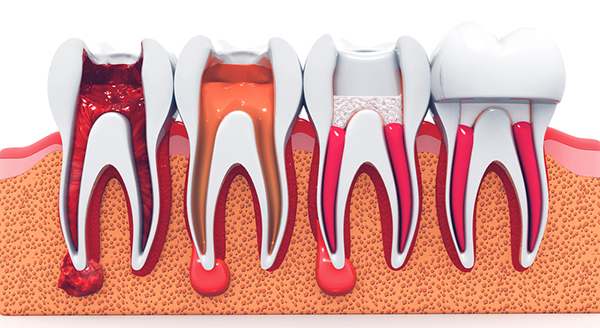Root canal treatment, also known as endodontic therapy, is a dental procedure designed to treat infection or damage to the pulp (the innermost part of the tooth containing blood vessels, nerves, and connective tissue). The procedure involves removing the infected or damaged pulp, cleaning and disinfecting the inside of the tooth, and then filling and sealing it. Here's an overview of the root canal treatment process:
ROOT CANAL TREATMENT

Indications for Root Canal Treatment:
Infected Pulp: Bacterial infection of the pulp can lead to pain, swelling, and abscess formation.
Trauma: Severe injury to a tooth can cause damage to the pulp.
Deep Decay: Advanced decay that reaches the pulp may necessitate root canal therapy.
Repeated Dental Procedures: Sometimes, multiple dental procedures on a tooth can lead to inflammation or infection of the pulp.
Procedure Steps:
Diagnosis: The dentist examines the tooth, takes X-rays, and assesses the extent of damage or infection to determine if a root canal is necessary.
Anesthesia: Local anesthesia is administered to numb the tooth and the surrounding area, ensuring the patient's comfort during the procedure.
Access Opening: The dentist creates an opening in the crown of the tooth to access the pulp chamber and root canals.
Pulp Removal: The infected or damaged pulp is carefully removed from the pulp chamber and root canals using specialized instruments.
Cleaning and Shaping: The inside of the tooth, including the root canals, is cleaned, shaped, and disinfected to remove any remaining bacteria and debris.
Filling: After cleaning, the empty spaces are filled with a biocompatible material called gutta-percha to seal the canals and prevent future infection.
Sealing: The access opening is sealed with a temporary or permanent filling to protect the tooth.
After Root Canal Treatment:
Restoration: In many cases, a tooth that has undergone root canal treatment may need a permanent restoration, such as a crown, to provide strength and protect against fractures.
Follow-up: Regular follow-up appointments are essential to monitor the healing process and ensure the tooth remains healthy.
Advantages of Root Canal Treatment:
Pain Relief: Root canal treatment alleviates pain associated with infected or damaged pulp.
Preservation of Tooth: The procedure allows for the preservation of the natural tooth rather than extraction.
Prevention of Spread: Root canal treatment prevents the spread of infection to surrounding tissues.
Common Misconceptions:
Pain: Modern techniques and anesthesia make root canal treatment relatively painless. The procedure is performed to relieve pain, not cause it.
Alternative Treatments: Extraction is not the only alternative to root canal treatment. Saving the natural tooth is generally preferable whenever possible.
It's important for individuals experiencing tooth pain or other symptoms to seek prompt dental evaluation, as early intervention can often prevent the need for more extensive procedures. If a dentist recommends a root canal, it is generally to preserve the tooth and restore oral health.
